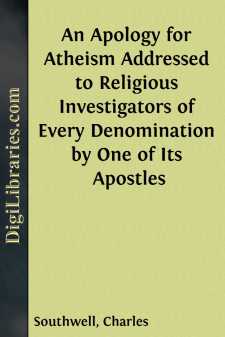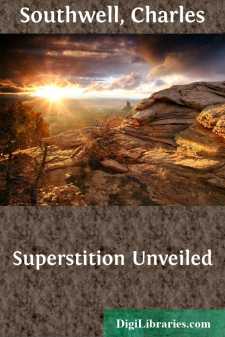Categories
- Antiques & Collectibles 13
- Architecture 36
- Art 48
- Bibles 22
- Biography & Autobiography 813
- Body, Mind & Spirit 141
- Business & Economics 28
- Children's Books 12
- Children's Fiction 9
- Computers 4
- Cooking 94
- Crafts & Hobbies 4
- Drama 346
- Education 46
- Family & Relationships 57
- Fiction 11826
- Games 19
- Gardening 17
- Health & Fitness 34
- History 1377
- House & Home 1
- Humor 147
- Juvenile Fiction 1873
- Juvenile Nonfiction 202
- Language Arts & Disciplines 88
- Law 16
- Literary Collections 686
- Literary Criticism 179
- Mathematics 13
- Medical 41
- Music 40
- Nature 179
- Non-Classifiable 1768
- Performing Arts 7
- Periodicals 1453
- Philosophy 64
- Photography 2
- Poetry 896
- Political Science 203
- Psychology 42
- Reference 154
- Religion 513
- Science 126
- Self-Help 83
- Social Science 81
- Sports & Recreation 34
- Study Aids 3
- Technology & Engineering 59
- Transportation 23
- Travel 463
- True Crime 29
An Apology for Atheism Addressed to Religious Investigators of Every Denomination by One of Its Apostles
Description:
Excerpt
AN APOLOGY FOR ATHEISM
It would be absurd to doubt that religion has an important bearing on all the relations and conditions of life. The connexion between religions faith and political practice is, in truth, far closer than is generally thought. Public opinion has not ripened into a knowledge that religious error is the intangible but real substratum of all political injustice. Though the 'schoolmaster' has done much, there still remain and hold some away among us, many honest and energetic assertors of 'the rights of man,' who have to learn that a people in the fetters of superstition, can never achieve political freedom. Many of these reformers admit the vast, the incalculable influence of Mahommedanism on the politics of Constantinople, and yet persist in acting as if Christianity had little or nothing to do with the politics of England.
At a recent meeting of the Anti-State Church Association it was remarked, that 'throw what we would into the political cauldron, out it came in an ecclesiastical shape'. If the newspaper report may be relied on, there was much laughing among the hearers of those words, the deep meaning of which it may safely be affirmed, only a select few of them could fathom.
Hostility to state churches by no means implies a knowledge of the close and important connection between ecclesiastical and political questions. Men may appreciate the justice of voluntaryism in religion, and yet have rather cloudy conceptions with respect to the influence of opinions and things ecclesiastical on the condition of nations. They may clearly see that he who needs the priest, should disdain to saddle others with the cost of him, while blind to the fact that no people having faith in the supernatural ever failed to mix up such faith with political affairs. Even leading members of the 'Third Estate' are constantly declaring their disinclination for religious controversy, and express particular anxiety to keep their journals free of everything 'strictly theological.' Their notion is, that newspaper writers should endeavour to keep clear of so 'awful' a topic. And yet seldom does a day pass in which this self-imposed editorial rule is not violated—a fact significant as fact can be, of that connection between religion and politics the author thinks has been far too little regarded.
It is quite possible the editors of newspapers have weighty reasons for their repugnance to agitate the much vexed question of religion, but it seems they cannot help doing so. In a leading article of this day's Post, [Endnote 4:1] we are told—'The stain and reproach of Romanism in Ireland is, that it is a political system, and a wicked political system, for it regards only the exercise of power, and neglects utterly the duty of improvement.' In journals supported by Romanists, and of course devoted to the interests of their church, the very same charge is made against English Protestantism. To denounce each other's 'holy apostolic religion' may be incompatible with the taste of 'gentlemen of the press,' but certainly they do it with a brisk and hearty vehemence that inclines one to think it a 'labour of love.' What men do con amore they usually do well, and no one can deny the wonderful talent for denunciation exhibited by journalists when writing down each other's 'true Christianity.' The unsparing invective quoted above from the Post is a good specimen....



